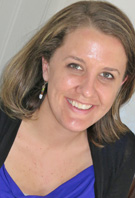Shannon Golden

Graduation Year: 2005
Major: with a concentration in Social Justice and Inequality. I also did the program in 2004.
Why did you choose Sociology?
I chose sociology because it seemed to provide a space to ask the questions about society that I found fascinating and important.
Which courses made the most impression on you?
I think Intro to Sociology my freshman year made a big impression on me, because after the course finished, approached me and asked if I'd thought about becoming a major. It's fair to say the trajectory of my career (and life) was altered because of that. Some of the upper division classes were really foundational to challenging my worldview and teaching me how to approach social problems from a sociological perspective--courses like Sociology of the Civil Rights Movement, Social Change, and Race and Ethnic Relations come to mind. I came to understand how sociological research was necessary to inform social change and address social problems.
Which professors impacted you?
Really, all of my professors impacted me because they were invested in not only teaching content in the classroom, but in mentoring me as a whole person. , my advisor, always went above and beyond in his efforts to build a relationship with me, seeking out conversations over meals about religion, the midwest, my family, and social theory. agreed to visit me in Uganda while on my HNGR internship, and he was always concerned not only about the progress of my research, but also my emotional, social, physical, and spiritual well-being. They both were truly exemplary mentors and served as models of lifelong intellectual curiosity.
What are you doing now? What does that look like?
I obtained my PhD in sociology at the University of Minnesota >> where I studied post-conflict social reconstruction, human rights, migration, and social conflict. I am currently a research fellow at the Kroc Institute for International Peace Studies at Notre Dame >> but after that, I will be looking for a position as a faculty member at a university, a job which is a mixture of research (collecting and analyzing data, then writing publications) and teaching. I find it rewarding because there is freedom to conduct research about any areas of society that I believe we need to understand more fully. There are opportunities to diffuse research findings and make them relevant to a broad audience of policymakers, practitioners, and the public. Additionally, teaching college students is very rewarding, guiding them through new discoveries about the social world and challenging them to stretch their worldviews, assumptions, and ways of thinking.
How and why did you choose to follow your path beyond graduation?
I decided to start the doctoral program in sociology for many of the same reasons I initially decided to become a sociology major. I saw sociology as a discipline that was addressing tough social problems. As an undergraduate student, I felt I had been equipped with the critical thinking and analytical skills needed to become a consumer or user of sociological knowledge. I decided to pursue a career in sociology, however, because I wanted to be part of the community of scholars that was producing such knowledge.
What advice could you give a potential major?
Your college years are a wonderful time to pursue anything and everything that fascinates you and ignites your curiosity or imagination. Take full advantage of this! Take a wide range of courses and pursue diverse opportunities outside of the classroom. I also do think that a sociology major is a great tool to aid you in this endeavor of thinking broadly and creatively about the world around you. A sociology major will equip you with a "sociological imagination" that will fundamentally alter your way of seeing society, no matter what career path you ultimately follow.